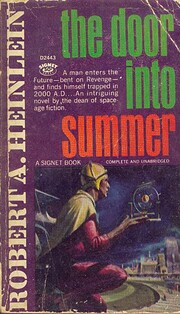

Click on a thumbnail to go to Google Books.
|
Loading... The Door into Summer (original 1957; edition 2013)by Robert A. Heinlein (Author)
Work InformationThe Door into Summer by Robert A. Heinlein (1957)
 » 24 more Favourite Books (796) SF Masterworks (40) Books Read in 2016 (2,155) 1950s (138) Books Read in 2021 (1,819) Books Read in 2017 (2,642) Books Read in 2012 (252) Time Travel Stories (26) #ReadingBingo2020 (20) Allie's Wishlist (72) Protagonists - Men (29) Fiction For Men (116) Favorite Childhood Books (1,582) No current Talk conversations about this book. Haven't read this Heinlein since I was in Junior High or so, I don't think. I remember liking it then, but it was pretty thin on this reading. I liked the way he got you right into the character at the beginning of the book, and some of the way he worked out the time travel aspects of the story. The engineering side of it was typical Heinlein, with some clever hand-waving. Funny that both the "futures" he wrote about in 1957 are in the past now. Getting to the end of Time Travel novels suggested in some website. I remember reading Heinlein sci-fi in the 70s and 80s. He struck me then as a serious misogynist, although I doubt I knew that term at the time. This one fits my memory well. It's a boy's book, written by a boy. I'd love to know the gender split for Heinlein readers. He doubt that he would retain many female readers. The plot revolves around a guy who falls in love with the 12 year old step-daughter of his business partner, and who then uses a combination of suspended animation and time-travel to marry his beau. Seriously. Seriously creepy. But the writing is good, the sci-fi well presented, and it could have been a good book. But . . . Since the novel starts in 1970 and then goes into the future, it's easy to forget that this was written in the 50s. Being written much before the computer era, and being set in the near future, which is actually our past now, it suffers from retrofuturism, like a lot of old science fiction. So of course expect no internet, no modern computers, no modern social values... So a modern reader has to be able to see beyond those obstacles in order to enjoy this fine story about time travel and the development of limited types of AI. In fairness to Heinlein, although he did not get the technological details right, the general idea about what kind of tasks AI can do is accurate. Anyway, other than that, the story is interesting, very readable and fast-paced. It's told in first person by a very creative engineer, and it features industrial theft, various types of time travel, cats and a love story that is actually kind of creepy. There's a kind of optimism and charm in the way the main character is always inventing something, and cares much more about the creation process itself than about the business element. Being written during the early stage of Heinlein's career, the narration is tight and focused, and I enjoyed it, much more than his later work although it's not my favorite Heinlein novel. A solid enjoyable read. A little slow in a couple spots. I wish Heinlein would have spent more time on the character's relationships and motives. Even now I'm not sure exactly why the protagonist, Davis, did everything he did, but I sure enjoyed the ride. It also had a really fun happy postmillenial, and almost ethical-judicial end to it. It's good to have some hope for the future. Never stop looking for that door to summer. no reviews | add a review
Belongs to Publisher SeriesBastei Science Fiction-Special (24176) Caminho de Bolso (41) Goldmann Zukunftsromane (075) — 5 more DistinctionsNotable Lists
Daniel Davis, put into a state of suspended animation for thirty years, awakens to a startling discovery. No library descriptions found. |
Current DiscussionsNonePopular covers
 Google Books — Loading... Google Books — Loading...GenresMelvil Decimal System (DDC)813.54Literature American literature in English American fiction in English 1900-1999 1945-1999LC ClassificationRatingAverage: (3.84) (3.84)
Is this you?Become a LibraryThing Author. |
||||||||||||||||||||||||||||||||||||||||||||||||||||||||||||||||||||||||||||||||||||||||||||||||||||||||||||||||||||||||||||||||||||||
La principal virtud de Puerta al verano es que ha envejecido muy bien. Pese a haber sido escrito hace más de 60 años, no se siente como un libro anticuado y lleno de artilugios ridículos que son supuestamente futuristas (cosa que si ocurre a veces con Asimov).
La historia es muy entretenida y la cantidad de guiños y referencias que Heinlein pone son muy buenos. Lo único malo es que el final es muy simple ya que todo se resuelve muy tranquila y banalmente.
Pero en general es un muy buen clásico de ciencia ficción. (